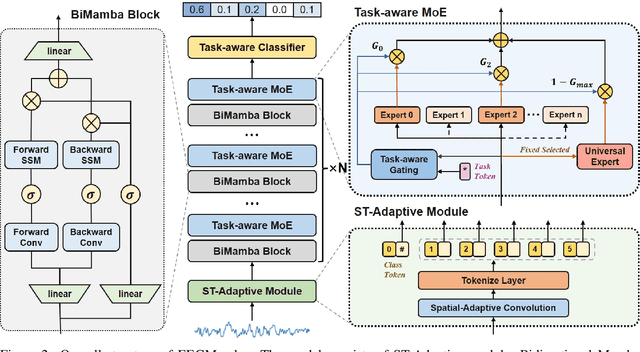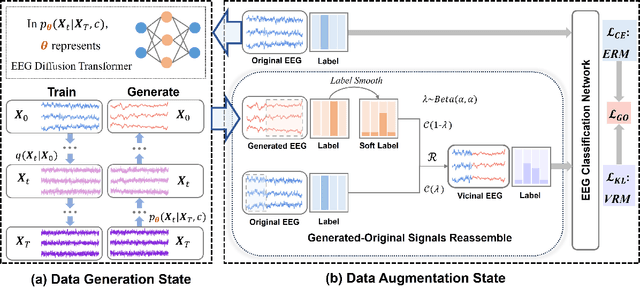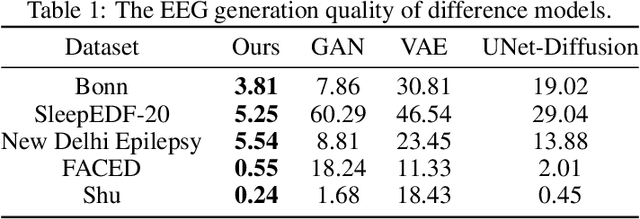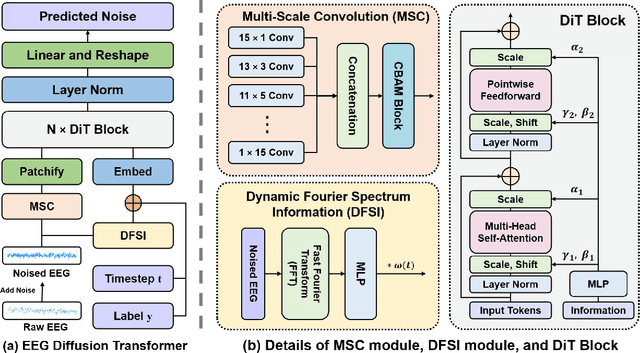Yiyu Gui
EEGMamba: Bidirectional State Space Models with Mixture of Experts for EEG Classification
Jul 20, 2024



Abstract:In recent years, with the development of deep learning, electroencephalogram (EEG) classification networks have achieved certain progress. Transformer-based models can perform well in capturing long-term dependencies in EEG signals. However, their quadratic computational complexity leads to significant computational overhead. Moreover, most EEG classification models are only suitable for single tasks, showing poor generalization capabilities across different tasks and further unable to handle EEG data from various tasks simultaneously due to variations in signal length and the number of channels. In this paper, we introduce a universal EEG classification network named EEGMamba, which seamlessly integrates the Spatio-Temporal-Adaptive (ST-Adaptive) module, Bidirectional Mamba, and Mixture of Experts (MoE) into a unified framework for multiple tasks. The proposed ST-Adaptive module performs unified feature extraction on EEG signals of different lengths and channel counts through spatio-adaptive convolution and incorporates a class token to achieve temporal-adaptability. Moreover, we design a bidirectional Mamba particularly suitable for EEG signals for further feature extraction, balancing high accuracy and fast inference speed in processing long EEG signals. In order to better process EEG data for different tasks, we introduce Task-aware MoE with a universal expert, achieving the capture of both differences and commonalities between EEG data from different tasks. We test our model on eight publicly available EEG datasets, and experimental results demonstrate its superior performance in four types of tasks: seizure detection, emotion recognition, sleep stage classification, and motor imagery. The code is set to be released soon.
Improving EEG Classification Through Randomly Reassembling Original and Generated Data with Transformer-based Diffusion Models
Jul 20, 2024



Abstract:Electroencephalogram (EEG) classification has been widely used in various medical and engineering applications, where it is important for understanding brain function, diagnosing diseases, and assessing mental health conditions. However, the scarcity of EEG data severely restricts the performance of EEG classification networks, and generative model-based data augmentation methods emerging as potential solutions to overcome this challenge. There are two problems with existing such methods: (1) The quality of the generated EEG signals is not high. (2) The enhancement of EEG classification networks is not effective. In this paper, we propose a Transformer-based denoising diffusion probabilistic model and a generated data-based data augmentation method to address the above two problems. For the characteristics of EEG signals, we propose a constant-factor scaling method to preprocess the signals, which reduces the loss of information. We incorporated Multi-Scale Convolution and Dynamic Fourier Spectrum Information modules into the model, improving the stability of the training process and the quality of the generated data. The proposed augmentation method randomly reassemble the generated data with original data in the time-domain to obtain vicinal data, which improves the model performance by minimizing the empirical risk and the vicinal risk. We experiment the proposed augmentation method on five EEG datasets for four tasks and observe significant accuracy performance improvements: 14.00% on the Bonn dataset; 25.83% on the New Delhi epilepsy dataset; 4.98% on the SleepEDF-20 dataset; 9.42% on the FACED dataset; 2.5% on the Shu dataset. We intend to make the code of our method publicly accessible shortly
 Add to Chrome
Add to Chrome Add to Firefox
Add to Firefox Add to Edge
Add to Edge